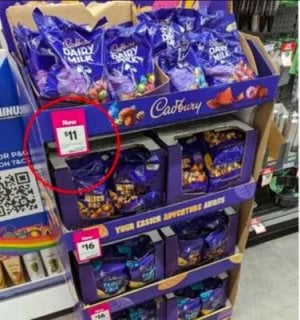Woolworths blasted over viral ‘price drop’ photo
- Replies 13
As Australian consumers gear up for the joy and celebrations of Easter, many are scouting the aisles for treats and festive goodies.
But in this economic climate, where every cent counts, a viral photo of a beloved seasonal treat taken at a Woolworths has revealed a less-sweet reality.
Shoppers eager to fill their baskets with chocolatey delights have stumbled upon a frustrating find: Cadbury Easter eggs, nestled invitingly on shelves with discounted tags that may not be all they're cracked up to be.
A vigilant customer noticed that a 440g bag of Cadbury’s Dairy Milk Egg Bags carried a 'prices dropped' label despite being priced a dollar higher than last year, catching the behemoth retailer in what looks to be a bit of marketing sleight of hand.
This year, the bag boasts a price of $12, up from a previous $11, albeit having briefly touched a high of $13.50 before Easter.
Nevertheless, the price drop claim isn't sitting well with eagle-eyed shoppers.

Leading consumer advocacy group CHOICE pointed out pricing strategies aren't just isolated incidents.
They discovered that 83 per cent of Aussie shoppers are baffled by in-store promotional ploys, leaving them uncertain whether they've snagged a bargain or been subtly duped.
Menacing tactics such as faux specials and deceptive discount labels muddy the retail waters, causing dismay for consumers.
Bea Sherwood, a Senior Campaigns and Policy Adviser from CHOICE, highlighted an easy yet overlooked method to discern a deal reasonably: checking the unit price. It is the most reliable way to ascertain whether you're genuinely pocketing a saving or clutching a cleverly marketed price.
In another viral post online, eagle-eyed customers also spotted a chocolate bunny sold at Coles for $10—about $4 per kilogram. This was enough for some to remember times when Easter treats were more affordable.
One shopper recalled, ‘Geez, I remember when you could buy Easter eggs for less than $5!! Also remember getting a really nice mint one from the local market, which was so good and only cost about $2!! and it was a decent size too.’
Another one noted, ‘Inflation is officially out of control.’
Another person also commented, ‘I remember when these were only $1. I'm struggling as it is, imagine if you're a family on a single income.’
Since the discovery went viral, both Coles and Woolworths have subtly lowered the price of their chocolate bunnies.
Coles dropped its bunny to $7, while Woolworths shaved off $2, bringing it down to $8.
Coles however clarified its price drop was unrelated to the online post.
In response to the issue, Cadbury stated: ‘The size, shape, and pricing of our Cadbury Dairy Milk range are tailored to enhance the eating experience and suit different product types. Our 250g bunny mentioned in the (social media) post has maintained its price since last year. Cadbury remains steadfast in our commitment to providing chocolate of the highest quality, crafted in Australia with the best local ingredients.’
Woolworths has yet to respond about the matter as of writing.
This isn't an isolated ordeal. Last Easter, the high cost of Cadbury eggs, which hit $20 for a 400g package, left consumers aghast.
Consumer and Retail Expert Gary Mortimer explained the premium on Easter chocolates is accounted for by their intricate shapes and the complexities in manufacturing them.
Add to this the campaign of general inflation and a spike in cocoa prices driven by adverse weather in West Africa, and you have the recipe for soaring Easter treat costs.
Shop wisely to protect your money from sneaky pricing tactics and hold stores accountable for honest pricing.
In times when frugality is not just prudent but necessary, it pays to stay vigilant.

Members, what are some of your favourite Easter treats to shop for and include in your shopping list? Did you notice any price differences this year? Share some of them in the comments below!
But in this economic climate, where every cent counts, a viral photo of a beloved seasonal treat taken at a Woolworths has revealed a less-sweet reality.
Shoppers eager to fill their baskets with chocolatey delights have stumbled upon a frustrating find: Cadbury Easter eggs, nestled invitingly on shelves with discounted tags that may not be all they're cracked up to be.
A vigilant customer noticed that a 440g bag of Cadbury’s Dairy Milk Egg Bags carried a 'prices dropped' label despite being priced a dollar higher than last year, catching the behemoth retailer in what looks to be a bit of marketing sleight of hand.
This year, the bag boasts a price of $12, up from a previous $11, albeit having briefly touched a high of $13.50 before Easter.
Nevertheless, the price drop claim isn't sitting well with eagle-eyed shoppers.

A price discrepancy at a Woolworths ahead of Easter triggered intense discussions online. Image credit: Reddit
Leading consumer advocacy group CHOICE pointed out pricing strategies aren't just isolated incidents.
They discovered that 83 per cent of Aussie shoppers are baffled by in-store promotional ploys, leaving them uncertain whether they've snagged a bargain or been subtly duped.
Menacing tactics such as faux specials and deceptive discount labels muddy the retail waters, causing dismay for consumers.
Bea Sherwood, a Senior Campaigns and Policy Adviser from CHOICE, highlighted an easy yet overlooked method to discern a deal reasonably: checking the unit price. It is the most reliable way to ascertain whether you're genuinely pocketing a saving or clutching a cleverly marketed price.
In another viral post online, eagle-eyed customers also spotted a chocolate bunny sold at Coles for $10—about $4 per kilogram. This was enough for some to remember times when Easter treats were more affordable.
One shopper recalled, ‘Geez, I remember when you could buy Easter eggs for less than $5!! Also remember getting a really nice mint one from the local market, which was so good and only cost about $2!! and it was a decent size too.’
Another one noted, ‘Inflation is officially out of control.’
Another person also commented, ‘I remember when these were only $1. I'm struggling as it is, imagine if you're a family on a single income.’
Since the discovery went viral, both Coles and Woolworths have subtly lowered the price of their chocolate bunnies.
Coles dropped its bunny to $7, while Woolworths shaved off $2, bringing it down to $8.
Coles however clarified its price drop was unrelated to the online post.
In response to the issue, Cadbury stated: ‘The size, shape, and pricing of our Cadbury Dairy Milk range are tailored to enhance the eating experience and suit different product types. Our 250g bunny mentioned in the (social media) post has maintained its price since last year. Cadbury remains steadfast in our commitment to providing chocolate of the highest quality, crafted in Australia with the best local ingredients.’
Woolworths has yet to respond about the matter as of writing.
This isn't an isolated ordeal. Last Easter, the high cost of Cadbury eggs, which hit $20 for a 400g package, left consumers aghast.
Consumer and Retail Expert Gary Mortimer explained the premium on Easter chocolates is accounted for by their intricate shapes and the complexities in manufacturing them.
Add to this the campaign of general inflation and a spike in cocoa prices driven by adverse weather in West Africa, and you have the recipe for soaring Easter treat costs.
Shop wisely to protect your money from sneaky pricing tactics and hold stores accountable for honest pricing.
In times when frugality is not just prudent but necessary, it pays to stay vigilant.
Key Takeaways
- A photo has circulated showing a Cadbury Easter egg product at Woolworths tagged with 'price dropped' despite being more expensive than the previous year.
- Consumer advocacy group CHOICE highlighted that confusing promotional practices in supermarkets make it difficult for shoppers to know if they are really getting a deal.
- Both Coles and Woolworths have been scrutinised for alleged deceptive pricing tactics amidst rising inflation and consumer discontent.
- A retail expert explained that the production complexity of Easter eggs and increased cocoa prices due to poor weather in West Africa might have led to higher costs.
Last edited:








